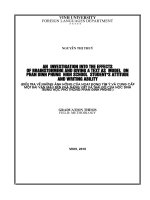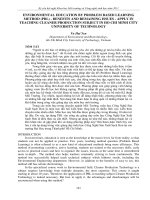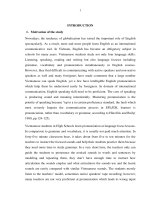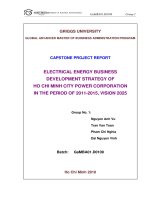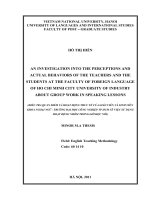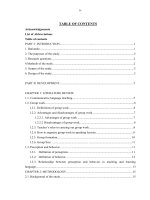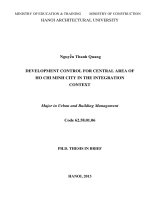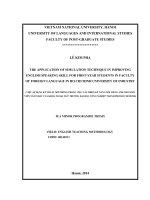An investigation into the perceptions and actual behaviors of the teachers and the students at the faculty of Foreign Language of Ho Chi Minh City University of.PDF
Bạn đang xem bản rút gọn của tài liệu. Xem và tải ngay bản đầy đủ của tài liệu tại đây (561.23 KB, 18 trang )
VIETNAM NATIONAL UNIVERSITY, HANOI
UNIVERSITY OF LANGUAGES AND INTERNATIONAL STUDIES
FACULTY OF POST – GRADUATE STUDIES
HỒ THỊ HIỀN
AN INVESTIGATION INTO THE PERCEPTIONS AND
ACTUAL BEHAVIORS OF THE TEACHERS AND THE
STUDENTS AT THE FACULTY OF FOREIGN LANGUAGE
OF HO CHI MINH CITY UNIVERSITY OF INDUSTRY
ABOUT GROUP WORK IN SPEAKING LESSONS
(ĐIỀU TRA QUAN ĐIỂM VÀ HOẠT ĐỘNG THƯC TẾ CỦA GIÁO VIÊN VÀ SINH VIÊN
KHOA NGOẠI NGỮ - TRƯỜNG ĐẠI HỌC CÔNG NGHIỆP TP HCM VÊ VIỆC SỬ DỤNG
HOẠT ĐỘNG NHÓM TRONG GIỜ HỌC NÓI)
MINOR M.A THESIS
Field: English Teaching Methodology
Code: 60 14 10
H NI, 2011
VIETNAM NATIONAL UNIVERSITY, HANOI
UNIVERSITY OF LANGUAGES AND INTERNATIONAL STUDIES
FACULTY OF POST – GRADUATE STUDIES
HỒ THỊ HIỀN
AN INVESTIGATION INTO THE PERCEPTIONS AND
ACTUAL BEHAVIORS OF THE TEACHERS AND THE
STUDENTS AT THE FACULTY OF FOREIGN LANGUAGE
OF HO CHI MINH CITY UNIVERSITY OF INDUSTRY
ABOUT GROUP WORK IN SPEAKING LESSONS
(ĐIỀU TRA QUAN ĐIỂM VÀ HOẠT ĐỘNG THƯC TẾ CỦA GIÁO VIÊN VÀ SINH VIÊN
KHOA NGOẠI NGỮ - TRƯỜNG ĐẠI HỌC CÔNG NGHIỆP TP HCM VÊ VIỆC SỬ DỤNG
HOẠT ĐỘNG NHÓM TRONG GIỜ HỌC NÓI)
MINOR M.A THESIS
Field: English Teaching Methodology
Code: 60 14 10
Supervisor: Tô Thị Thu Hương, Ph.D.
H NI, 2011
iv
TABLE OF CONTENTS
Acknowledgements
List of Abbreviations
Table of contents
PART I: INTRODUCTION………………………… ………………….… ………… 1
1. Rationale 1
2. The purposes of the study…… 2
3. Research questions 2
4.Methods of the study 2
5. Scopes of the study 3
6. Design of the study 3
PART II: DEVELOPMENT 5
CHAPTER 1: LITERATURE REVIEW
1.1. Communicative language teaching 5
1.2. Group work 6
1.2.1. Definitions of group work 6
1.2.2. Advantages and disadvantages of group work 7
1.2.2.1. Advantages of group work 7
1.2.2.2 Disadvantages of group work 8
1.2.3. Teacher’s roles in carrying out group work 8
1.2.4. How to organize group work in speaking lessons 8
1.2.5. Group formation 10
1.2.6. Group Size. 11
1.3. Perception and behavior 11
1.3.1. Definition of perception 11
1.3.2. Definition of behavior…………………………………………………………12
1.3.3. Relationship between perception and behavior in teaching and learning
language 13
CHAPTER 2: METHODOLOGY 15
2.1. Background of the study 15
v
2.1.1. Description of the students at FFL, HUI 15
2.1.2. Description of the teachers at FFL - HUI.…………………… …… 15
2.1.3. Description of the physical setting … 16
2.1.4. Description of the subject matter ………………………………………….16
2.2. Design and data analysis 16
2.2.1. The student sample 16
2.2.2. The teacher sample 17
2.2.3 Research instruments 17
2.2.4. Procedure…………………………………………………………… ……18
. CHAPTER 3: RESULTS
3.1. Questionnaire results………………………………………………… ………19
3.1.1. The teachers’ and students’ perceptions of the best way to teach and learn
speaking in class 19
3.1.2. The students’ feelings when they work in groups 20
3.1.3. The teachers’ perceptions of the appropriate time for each group work
activity…………………………………………………………………………… …… 21
3.1.4. The teachers’ and the students’ perceptions of preferred group
members 21
3.1.5. The teachers’ and the students’ perceptions of the most appropriate number of
members in each group 22
3.1.6. The teachers’ and the students’ perceptions of the benefits and the weaknesses
of group work for improving speaking skill 23
3.1.7. The teachers’ and the students’ perceptions of the things should be done by the
instructor before activity………………………………… ………………………… … 25
3.1.8. The teachers’ and the students’ perceptions of the things should be done by
the instructor during activity 25
3.1.9. The teachers’ and the students’ perceptions of what the teachers should do
after activity ………………………………………………………………… ……… 26
3.1.10. The teachers’ and the students’ perceptions of the difficulties when carrying
out group work 26
3.2. Class observation 27
CHAPTER 4: MAJOR FINDINGS AND RECOMMENDATIONS…………………… 32
4.1. Major findings …………………………………………………………………….32
vi
4.2. Recommendations ……………………………………………………………… 36
PART III. CONCLUSION ……………………………………………………………… 43
References
Apendix A- Teacher questionaire
Apendix B- Student questionaire
Apendix C- Observation sheet
Apendix D- Collected data
1
PART A: INTRODUCTION
1. Rationale
- English has been widely used in many areas such as politics, economics, tourism,
electronics, telecommunication, culture and science and technology. English is not only a
means but also a key to accessing the latest achievements of science and technology.
Therefore, it is necessary for many Vietnamese to have a good command of English to
satisfy the growing needs in a developing country like Vietnam.
- Being a teacher of English at Faculty of Foreign Language – Ho Chi Minh
University of Industry (FFL-HUI), the researcher is well aware of the importance of using
group work to help energize the speaking class. Like many other teachers working here,
however, the researcher has also faced many challenges in organizing and managing group
work during English speaking lessons. For instance, the noise created by students when
they work in groups, student’s laziness, students’ use of their mother tongue, etc.
- In fact, there is a close relationship between one’s perception and his/her
behaviors. Yu (2004) stated that teachers' perceptions "construct" their practices, which in
turn, lead to whatever progress both the learners and the teachers achieve. Practice and
progress in language learning and teaching will re-construct teachers' perceptions of L2
development. Teachers need to reflect upon their own ideas and practices to be better
informed. Dewey (1933) argued that teachers should be reflective-practitioners through
questioning the beliefs and methods in their own experimental approach to schooling -
psychology and sociology being tools or resources for the construction of new educational
hypotheses to be tested against experience.
- To meet the increased needs of teachers and students, at FFL- HUI, the author of
this study is determined to choose this area to do research on. This study is intended to
make a modest contribution to investigating what the teachers’ and students’ points of
views about group work activities and what they really do before, during and after this
activity. The results of the study, hopefully, enhance the flexibility of using group work to
create positive, dynamic and effective atmosphere in English speaking (speaking) lessons,
and more importantly improve students’ oral practice of English.
2. Aims of the study
The first purpose of this study was to examine teachers’ and students’ perceptions of using
group work to teach and learn English speaking at the FFL-HUI. That is to say, the
researcher aimed at finding how the participants at the chosen setting think about the
2
effectiveness of this activity to improve English speaking skill for the learners. Moreover,
the study also aimed at investigating the actual behaviors of the participants when group
working in the real lessons to compare with their perceptions. Finally, the results of this
study helped to facilitate the application of group work in teaching and learning speaking
to improve the effectiveness of speaking lessons at the FFL-HUI
3. Research questions
a What are FFL-HUI teachers’ perceptions of group work in English speaking class?
1.b What are FFL-HUI students’ perceptions of group work in English speaking class?
2.a What are the teachers’ actual behaviors when group working in English speaking
class?
2.b What are the students’ actual behaviors when group working in English speaking
class?
3. How to further improve the effectiveness of group work in speaking lessons at FFL-HUI
4. Research methodology
To achieve the aims of the study, a mixed method combining both qualitative and
quantitative styles was used
5. Scope of the study
The study only focuses on speaking skill. Instead, the researcher only intends to draw a
brief overview of the point of view and actual behaviors of the teachers who have
experienced in teaching speaking and of the third-year students in the FLL-HUI about
group work.
6. Design of the study
The study consists of three main parts:
Part I, Introduction, presents the rationale, purposes, research questions, scope, methods
and the design of the study.
Part II, Development, is organized into four chapters.
- Chapter 1, Literature review, reviews such basic concepts and knowledge relevant
to the study such as Communicative Language Teaching approach, some basic
factors of group work as well as theory of perception and its importance in
language teaching.
- Chapter 2, Methodology, provides an overview of the current situation of teaching
and learning speaking at FFL-HUI. Sampling, Instruments and Procedures for Data
collection and analysis are also presented in this chapter.
- Chapter 3, Results, presents the research results,
3
- Chapter 4, Recommendations, discusses the major findings of the research and also
suggests some recommendations to further improve the effectiveness of group work
in teaching speaking at FFL-HUI.
Part III, Conclusion, summarizes the major findings and suggestions. The limitations of the
study and recommendations for further studies are also included in this part.
References and appendices complete the thesis.
PART B: DEVELOPMENT
CHAPTER 1: LITERATURE REVIEW
1.1. Communicative language teaching
1.2. Group work
- Definitions of group work
- Advantages and disadvantages of group work
- Advantages of group work
- Disadvantages of group work
- Teacher’s roles in carrying out group work
- How to organize group work in speaking lessons
- Group formation
- Group Size.
1.3. Perception and behavior
- Definition of perception
- Definition of behavior
- Relationship between perception and behavior in teaching and learning language
CHAPTER 2: RESEARCH METHODOLOGY
2.1. Background to the study
2.1.1. The students at FFL - HUI
- A lot of them are from the south of Vietnam, others are from the central, even from
provinces in the north of the nation.
- There are about 3000 students at the FFL-HUI whose ages are from 18 to 22. They
are following different courses including university level (4 years long); college
level (3 years long); and vocational college (3 years long).
2.1.2. The teachers at FFL - HUI
FFL-HUI consists of over 40 teachers of different ages. The female teachers take
80% and the male ones take 20%. The youngest teachers are about 23 years old and the
4
oldest are about 55. At present, about 90% of the teachers at the FFL-HUI are the Masters
of Art. The rest numbers are still Bachelors or Art. They have from 3 to 30 years of
teaching experience. A lot of them have studied overseas and got the M.A. certificates
there. The teachers at FFL-HUI are from many different areas in the country, thus, their
accents and behaviors are quite different.
2.1.3. The physical setting
At FFL - HUI, English teaching and learning activities are mostly carried out inside
the classrooms which are specially designed for the faculty. There are about 12 classrooms
with 16 desks in each. Every classroom is equipped with a board, a teacher’s table, an LCD
plasma TV which can be easily used as a projector or a TV, a modern system of
loudspeakers. The desks are about 1.5 meters long and put in two parallel rows. In term of
class size, the average number of students in each class is from 30 to 35. This number is
still large in a language class.
The materials for reference and self-study are available for both teachers and
students. In the school library, there are a number of language books which are quite
helpful for teachers and students, it takes quite a long time to find and get the materials
though. The small library at the faculty office is also available for readers in the
department. There are not many books here but it is being improved. There is a lab room at
the faculty which is really modern for the language lessons. There are about 35 computers
which are connected to Internet. The teacher’s computer and the students’ ones are linked
closely.
2.2. Samples and data collection tools
2.2.1. The student sample
60 third-year students at the FFL – HUI (including 10 males and 50 females) took part in
the questionnaire survey. These students are the ones who consent to participate in the
research. 10 students were randomly selected among these 60 for interviews to get clearer
explanations for the choice in the questionnaire.
2.2.2. The teacher sample
The researcher only aimed at finding the perceptions and behaviors of the teachers who
have experienced in teaching speaking to English-major students. Therefore, the
questionnaires were delivered to 10 teachers who have been teaching speaking English for
more than 5 years.
2.2.3. Research instruments
5
Two questionnaires, one for teachers and the other for students were developed.
The former has 12 multiple – choice, open – ended questions; the later has 12 similar
questions. The questions in the two questionnaires are mainly used to explore the teachers’
and students’ perceptions, or the way they think about, of using group work to teach
speaking efficiently.
Oral interviews were given after the researcher had analyzed the results of the
questionnaires for triangulation. The researcher carried out the interviews with 10 students
and 5 teachers. All of them are the members who did the questionnaires and randomly
chosen. The purposes of interviewing are to get clearer explanations for the choices in the
questionnaires.
2.2.4. Procedure
Data were collected and analyzed in the following steps:
- Delivering questionnaires to the 10 teachers and 60 third-year students at the FFL-
HUI.
- Analyzing the questionnaires data by looking for and grouping the common and
recurrent themes in the data with the use of descriptive statistics.
- Interviewing the teachers and the students to get further information for the data in
the questionnaires.
- Basing on the interviews and the questionnaires, identifying the contents to observe
in the teachers’ and the students’ actual classroom practice.
- Collecting the data on the teachers’ and the students’ practices via class
observations. Observation of 10 speaking lessons was made according to designed
criteria.
- Analyzing observation data based on the observation scheme.
- Comparing the results of actual class observation with the teachers’ and the
students’ perceptions reported in the questionnaires and interviews.
In short, necessary issues relating to how to carry out the thesis were illustrated clearly in
the chapter 2. We have decribed specifically the real situations of the context, participants
as well as the method of collecting, analyzing the data. The following chapter will present
the major results of the study.
CHAPTER 3: RESULTS
3.1.1. The teachers’ and students’ perceptions of the best way to teach and learn
speaking in class
3.1.2. The students’ feelings when they work in groups
6
3.1.3. The teachers’ perceptions of the appropriate time for each group work activity
3.1.4. The teachers’ and the students’ perceptions of preferred group members
3.1.5. The teachers’ and the students’ perceptions of the most appropriate number of
members in each group
3.1.6 The teachers’ and the students’ perceptions of the benefits and the weaknesses
of group work for improving speaking skill
3.1.7 The teachers’ and the students’ perceptions of the things that should be done by
the instructor before activity
3.1.8 The teachers’ and the students’ perceptions of the things should be done by the
instructor during activity
3.1.9 The teachers’ and the students’ perceptions of what the teachers should do after
activity
3.1.10 The teachers’ and the students’ perceptions of the difficulties when carrying
out group work
3.2. Class observation
CHAPTER 4: MAJOR FINDINGS AND RECOMMENDATIONS
4.1. Major findings
4.1.1. The organization of groups
- Both the teachers and the students at the FFL – HUI think that a group should contain
from 3 to 6 members. The appropriate number of group members is an influential factor to
the effectiveness of an activity because if the groups are too large, it can reduce the
students’ interest in participating into the task, or it can create opportunities for the lazy
students to do another thing rather than getting involved into the discussion.
- The investigated teachers at the FFL – HUI think that putting students of the same
proficiency, different sexes, random groups and surrounding students is the good ways.
Ages and interests of the students are not important factor to concern before arranging the
learners into groups. In the mean time, the investigated students think that working in
groups with the students of the same interests, mix proficiency levels, surrounding
partners, different interests, randomly grouped really promotes them in completing the task
as well as improves their speaking skill. Most of the students do not care for the same or
different age and gender partners when working in class.
- All of the teachers agree that the most appropriate time for each group activity is about 15
minutes. If the time-limitation is less than 15 minutes, the students can not complete the
task and possibly feel stressed. In contrast, if the task lasts so long, the students may finish
it much earlier than the time given and start chatting or doing something else.
7
4.1.2. Before starting group working
Before beginning the activity, the investigated teachers think that they should give
clear instructions and then putting the students into appropriate groups, telling them the
aims of the activity or giving them some time to get ready for the task. In the mean time,
the students think that the most important thing to be done by their teachers before starting
a group work activity is giving clear instructions, then creating competitive atmosphere
among the class. After that, the teacher also needs to provide necessary related vocabulary
and necessary structures which will be helpful for the students to express the ideas while
discussing.
4.1.3. During the group work activity
The teachers have quite similar perceptions of what they should do while their
students are working in groups. The most important thing to be done is to go around and
provide helps when necessary. Next, the teachers need to minimize the their talking time
and let the students speak in stead. The teachers also think that it is necessary for them to
give the feedback, praise and encouragement when the students are discussing.
Alternatively, 90% of the teachers also think that they should stand at some corners of the
classroom and keep an eye on the groups, they also need to keep close to the quiet students
and take notes for feedbacks later. All of the teachers have the same opinion that it is not
good for the teachers to just stand in front of the class or remain the teachers’ seat and
observe the students’ behaviors. They had better come closer to the students. They also
disagree with the idea that the teachers keep close to the talkative students. Especially,
100% of the teachers think that they should avoid speaking so much and keeping
interrupting and reminding students’ errors during activity.
For the students, in their mind, they expect their teachers to go around and provide
helps and take notes for feedback to take notes the mistakes and then correct them later.
The teachers also need to give their students feedbacks, praises and encouragement which
help them feel more confident and excited about speaking English. Most of the students do
not think that their teachers should be passive and quiet.
In short, the students and the teachers have quite similar ideas of what the
instructors should do during the activity.
4.1.4. After finishing group working
After the time set for the task is over, all of the students and the teachers have the
same perception that the teachers should give feedback for the students’ work. The
students expect the teachers to correct the mistakes that they make during the discussion.
8
However, the teachers do not think so. They do not pay much attention to the errors but to
the proficiency and the ideas rather than correcting the mistakes. The teachers think that it
is more important to promote the learners’ interests in learning the subject and help them
increase the ability to express ideas naturally, especially for the third-year students.
4.1.5. Difficulties of the teachers and the students in group working
For the students, their main problems are that they do not know to express their
own ideas even when they have something to say.
Other students have other difficulties such as they do not have enough time to
prepare and speak, or the students are quiet so that their friends do not let them speak.
For the teachers, they do not do the same things like the students, thus, their
difficulties in applying group work are quite different from those of the students
The most popular problem of the teachers have is the immovable class setting
arrangement. That is to say, the tables and the chairs are immovable to form group work
activities. They have to ask their students to move from this place to another one to form
the right groups. It may take a lot of time. 100% of the teachers find it hard to organize a
group work activity because of the unsuitable physical setting. The second biggest problem
that all of the 10 teachers agree with is the multi – level class. Although, the students had
mostly the same level of English proficiency at the beginning of the course, in the third –
year, their levels are obviously different. They are not at the same levels any more.
Therefore, it is not simple for the teachers to put the students in the right groups in
accordance of the same proficiency levels. The next problems are that the students overuse
mother tongue in groups, the students’ resistant participation and large class-size.
Interestingly, only a few teachers said the subjective reasons cause troubles for them to
carry out the group work activities. For instance, only 1 of the 10 teachers said that he is
lack of teaching experiences and academic training about group work. One another
teachers said she sometimes does not have enough money to buy materials and develop
teaching aids.
- What are the teachers’ and the students’ behaviors in group working?
In the first step - presentation, they often presented the task by explaining what the students
have to do, what structures they have to practice and whom they have to work with. The
needed vocabulary was also provided in some classes before activity. All of the teachers
gave instructions in English, but some spoke slowly and clearly enough, some did not.
Some teachers gave examples by showing sample products; others made an example with
some students. As a result, in the classes in which the instructions were clearly provided,
9
the task was successfully performed. In contrast, in the classes that the students were not
clear what they have to do or they misunderstood the instructions, that was because the
teachers did not talk slowly and clearly enough, the task failed.
In forming groups of students, the teachers here preferred to put the students sitting
near or close to each other or they based on some similar physical characteristics to form
the groups. They rarely based on ages or genders, levels of proficiency or interest to put the
students in relevant groups. The reasons for these choices were that the classroom furniture
is fixed and they did not want to waste time on seeking for the students’ own information
to form the groups. The average number of students in each group was from 3 to 6. They
never formed large-size groups because they thought it would cause some noise and waste
of time.
In the second step – process, the teachers mainly took part in as a guider or an observer.
They were successful in letting the students work freely in their group and they offered
some help only when necessary. However, they failed in keeping the students using the
target language and regulating the students’ participations in groups. The students used a
lot of Vietnamese during they worked in groups and there were still some students did
nothing or did not take part in the group work.
The work was rarely on time in spite of the time limited set before the work has been
started. That was because the difficulty of the work was not accurately accounted. There
was often some noise when the work was too easy and the students easily finished it and
began to chat. There were also some complaints when the students could not finish the task
on time because it was so difficult or too long.
The teachers often did the last step-feedback in different ways. Most of them asked
some groups to stand up and perform their work for the others in class to comment or
correct some mistakes. The teachers often gave some additional explanations and the key if
there was one. Some others gave comments, correct all the mistakes and gave marks. One
things should be emphasize here is that the teacher often tried to correct all the mistake
appeared, both linguistic and grammatical ones. That is not necessary according to
communicative approach in language teaching. The communicative approach shows that
not all mistakes need to be corrected; the main aims of the language learning is to receive
and convey meaningful ideas, and correcting should be focused on mistakes that interfere
with this aim, not on inaccuracies of usage (Ur. 1996:244). There were some cases where
the teachers did not give feedback.
4.2. Recommendations
10
Basing on the results of the investigations and the analysis of the collected data, the
researcher gives some suggestions to promote the effectiveness of using group work in
speaking lessons. This session also gives the answer for the third research question.
(3). How to futher improve the effectiveness of group work in speaking lessons at EFL-
HUI?
Basing on the investigated data and the real behaviors of the participant and also the
quality of teaching and learning speaking at the FFL-HUI, the researcher gives some
suggestions for the students, the teachers and the staff administration to improve the
effectiveness of improving speaking lessons at the faculty.
PART III CONCLUSION
1. Summary of the study
Above all, the random selection of the participants in the FFL – HUI to carry out the
research of increasing the effetiveness of using group work to teach speaking for the
second – year students is a reliable way to investigate the perceptions of the participants at
the research context. By applying three research instruments namley questionnaires, class
observation and interview for both the students and the terachers at the FFL – HUI, we
have reached the answers to the three research questions.
For the first question, “What is the teachers and the students’ perception about using group
work in English speaking lessons?” most of the participants think that it is crucial to use
group work in English speaking lessons. The teachers and the students agreed that group
working helps the learners study more effectively, have more English speaking time and
learn from their friends. They are also well-aware of what they should do before, during
and after activity in order to increase the effectiveness of the activity. The learners shared
some of their opinions about the preferred techniques that they expect from the teachers,
such as the way to form groups, the number of students in each group as well as the kind of
activity.
For the second question, “what is the teachers and the learners’ actual behaviors of using
group work in English speaking classes?” we have found that In the first step -
presentation, they often presented the task by explaining what the students have to do, what
structures they have to practice and whom they have to work with. The needed vocabulary
was also provided in some classes before activity. All of the teachers gave instructions in
English, but some spoke slowly and clearly enough, some did not. Some teachers gave
examples by showing sample products; others made an example with some students. As a
result, in the classes in which the instructions were clearly provided, the task was
11
successfully performed. In contrast, in the classes that the students were not clear what
they have to do or they misunderstood the instructions, that was because the teachers did
not talk slowly and clearly enough, the task failed.
In forming groups of students, the teachers here preferred to put the students sitting
near or close to each other or they based on some similar physical characteristics to form
the groups. They rarely based on ages or genders, levels of proficiency or interest to put the
students in relevant groups. The reasons for these choices were that the classroom furniture
is fixed and they did not want to waste time on seeking for the students’ own information
to form the groups. The average number of students in each group was from 3 to 6. They
never formed large-size groups because they thought it would cause some noise and waste
of time.
In the second step – process, the teachers mainly took part in as a guider or an observer.
They were successful in letting the students work freely in their group and they offered
some help only when necessary. However, they failed in keeping the students using the
target language and regulating the students’ participations in groups. The students used a
lot of Vietnamese during they worked in groups and there were still some students did
nothing or did not take part in the group work.
The work was rarely on time in spite of the time limited set before the work has been
started. That was because the difficulty of the work was not accurately accounted. There
was often some noise when the work was too easy and the students easily finished it and
began to chat. There were also some complaints when the students could not finish the task
on time because it was so difficult or too long.
The teachers often did the last step-feedback in different ways. Most of them asked
some groups to stand up and perform their work for the others in class to comment or
correct some mistakes. The teachers often gave some additional explanations and the key if
there was one. Some others gave comments, correct all the mistakes and gave marks. One
things should be emphasize here is that the teacher often tried to correct all the mistake
appeared, both linguistic and grammatical ones. That is not necessary according to
communicative approach in language teaching. The communicative approach shows that
not all mistakes need to be corrected; the main aims of the language learning is to receive
and convey meaningful ideas, and correcting should be focused on mistakes that interfere
with this aim, not on inaccuracies of usage (Ur. 1996:244). There were some cases where
the teachers did not give feedback.
12
Last but not least, for the third research question, “How to further improve the
effectiveness of group work in English speaking lessons?”, the reseacher has found that in
order to have a good solution for the problem, it needs the efford and contribution from the
the teachers, the students and the administration. For the teachers, it is necessary for them
to raise the students’ awareness of self-responsibility, use group work effectively. They
also need to train students the group work skill in every lesson. Moreover, it is important
for the teachers to establish good rapport with the students as well as train themselves to be
good teachers. For the atministration, they should reduce the class-sizes, improve
classroom facilities, and it is crucil for them to give more support to the teachers. For the
students, they should be encouraged to cooperate with their teacher, take risks, and solve
their own problems
2. Limitations of the study
As stated in the introduction of the study, the researcher only intends to investigate
the perceptions and behaviors of the teachers and the third-year students at the FFL-HUI,
then making some suggestions for improvement. Therefore, in different settings or with
other teachers and students, the results of the investigation may be different. Moreover, the
respondents of this study are limited to the third-year students at the FFL-HUI, thus their
opinions about using group work in the speaking-class might not representative of all the
students at the FFL-HUI in particular and all the students learning English nationwide in
common.
3. Suggestions for further studies
The following topics are suggested to carry out the research on:
- The non-English majored teachers’ and students’ perceptions of using group work
and their behaviors in the class practice.
- Maximizing the quality and quantity of interaction in speaking classes by using
group work.
- Factors hinder the effectiveness of using group work to teach and learn speaking.
13

